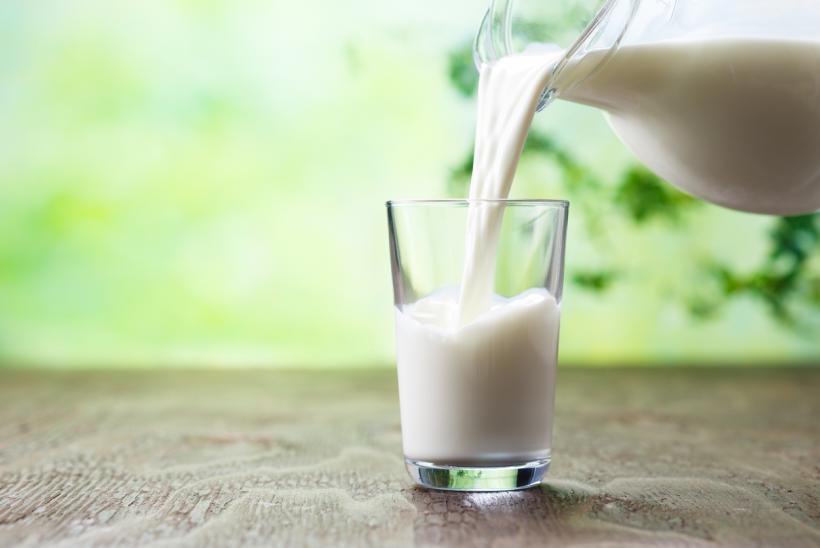3 Myths About Milk Debunked with Dietitian Bahee Van de Bor
Milk matters as strong bones rarely fracture but they require calcium, a mineral found in dairy and plant foods, for its strength
The relationship between calcium, vitamin D and bone health is thought to be well established, and yet worldwide, osteoporosis causes more than 8.9 million fractures annually, resulting in an osteoporotic fracture every 3 seconds.
Conflicting research also suggests that the highest consumers of dairy are not always protected from breaking bones, indicating that more than one nutrient, such as potassium and vitamin D, may be important in bone health.
Myth one: children don’t need milk.
False. Toddlers between the ages of 1-3 years require 350mg of calcium per day.
Despite research suggesting that calcium alone is not preventative for future fractures, cow’s milk is easily the most concentrated source for children providing 120mg calcium per 100ml.
Plant milks that are equally fortified are another source. It’s a treasured drink in the morning and evenings and may be incorporated by families as part of a bedtime routine.
Without a calcium-rich drink, meeting children’s requirement can be tricky as toddlers are unreliable eaters, meaning, intake of food can vary dramatically from one day to the next. This is perfectly normal; however, it is important to plan for a daily calcium-rich source as part of a balanced diet.
If your child follows a plant-based diet, plant foods do contain absorbable calcium but due to the high fibre nature of the diet, a calcium fortified plant milk is advised.
Why do children need so much calcium?
Worldwide, 1 in 3 women and 1 in 5 men aged over 50 experience osteoporotic fractures.
Calcium is only one of the building blocks essential for strong bones, but its requirements must be met with suitable food and drinks during rapid growth in childhood years.
NHS England also explain that bones are at their thickest and strongest in early adult life with density continuing to increase until late 20s. But bones don’t remain thick forever, it’s density gradually starts to decline from around the age of 35.
Priming children to eat a balanced diet that includes calcium as well as potassium-rich fruit and vegetables crucial for bone health may be key during this period of rapid growth.
Myth Two: Calcium from Milk is Poorly Absorbed
Calcium absorption in the gut is complex, with certain minerals such as vitamin D, and borax boosting its absorption whilst high salt and protein intake and phosphorus, a mineral in cola, and processed food interferes and has the opposite effect.
Science suggests that up to a third of calcium from dairy is absorbed. This sounds low, however, as it is an abundant source the total amount of calcium absorbed is considerable and its moderate bioavailability compensates for this.
Furthermore, to account for children’s higher requirements for calcium, their bodies can also increase absorption rates by up to 50 percent, particularly when intake is low.
Myth Three: Plant foods are poor sources of calcium
Some plant foods offer considerable amounts of calcium due to high bioavailability.
Plant foods whereby more than 50 percent is absorbed include brussels sprouts, kale, mustard greens, broccoli, bok choy, cauliflower and foods that are fortified with calcium.
Other plant sources of calcium that are reasonably absorbed include almonds, sesame seeds, sweet potatoes and red, white and pinto beans.
The bottom line
Children should be encouraged to eat and drink calcium-rich foods daily to reduce their risk of osteoporotic fractures as adults. Dairy is a good source of calcium that is absorbed well. Both cow or a calcium enriched plant milk alongside a diet rich in legumes, fruit and vegetables can help children meet their daily nutrient targets for optimal bone health.
Bahee Van De Bor
Specialist Paediatric Dietitian
Having studied nutrition and dietetics at university in New Zealand, she went on to publish her first cookbook for people with renal or kidney disease. At Great Ormond Street Hospital (GOSH) Ms Van de Boor works with many different departments to provide expert advice for the children in her care including gastroenterology, SNAPS, nephrology, metabolic medicine and the epilepsy team in reference to the ketogenic diet.
Ms Van de Bor is the owner of UK Kids Nutrition and can provide advice for a number of feeding difficulties and choices (such as breast feeding or weaning) for babies, pre-school children, school age children and adolescents as well as providing advice on exclusion diets including food allergies and aversions, vitamin/mineral intake and weight gain and growth monitoring issues.
Ms Van de Bor regularly teaches at Masters level and to a multidisciplinary audience at national and international level. She recently prepared and delivered a renal teaching module in Kuwait and delivered a lecture on nutrition in children with short gut in France.
Ms Van de Bor is currently developing a web-based application for use by children and families following a ketogenic diet


